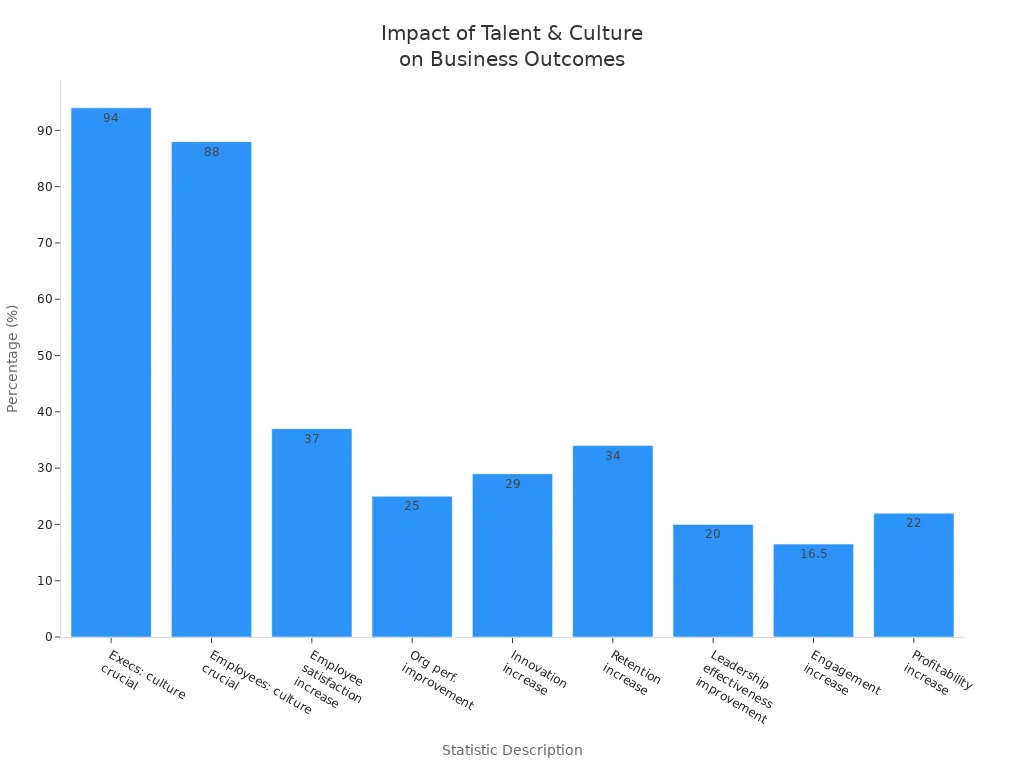Talent & Culture Strategy at Amazon

Amazon’s talent strategy helps the business do well. It brings together high standards, technology, and a strong culture. Amazon’s way of including people and growing talent helps new ideas and helps workers grow. Amazon spends money on leadership, learning new skills, and emotional intelligence. This helps people be more creative and work better in teams. The table below shows how culture and talent strategy help the business:
Statistic Description | Numerical Evidence | Source |
|---|---|---|
Executives who believe distinct workplace culture is crucial to business success | Deloitte | |
Employees who believe distinct workplace culture is crucial to business success | 88% | Deloitte |
Increase in innovation with aligned learning opportunities | 29% | C-Suite Strategy Blog |

Amazon wants a team with many different people. It uses new technology to make a place where everyone can grow. This helps the company get good results that last.
Introduction
Overview of Amazon
Amazon is one of the biggest employers in the world. It has workers in many countries. In 2025, about 1.56 million people work for Amazon. The company cares about diversity and inclusion. In 2024, 42% of workers are women and 58% are men. In the U.S., workers come from many backgrounds. There are 36% White, 26% Black or African American, 22% Hispanic or Latino, 13% Asian, and 3% from other groups. Senior leaders include 32% women. The board of directors has 40% women.
Category | Statistic / Description |
|---|---|
Total workforce (2025) | Approximately 1.56 million employees globally |
Gender composition (2024) | 42% women, 58% men |
U.S. Race/Ethnicity (2024) | White: 36%, Black/African American: 26%, Hispanic/Latino: 22%, Asian: 13%, Other: 3% |
Senior leadership gender | 32% women, 68% men |
Board of directors gender | 40% women, 60% men |
Technical roles gender | 28% women, 72% men |
Workforce in operations | ~65% (about 1 million) work in fulfillment, delivery, logistics |
Workforce growth trend | Moderate 2-3% annual growth expected, driven by international expansion and AWS growth |
Automation impact | 750,000+ robots support 75% of orders, enhancing productivity without reducing jobs |
Diversity commitment | Aiming for gender parity in senior leadership by 2030; expanding recruitment of underrepresented groups |
Amazon’s team keeps changing and growing. The company thinks it will grow by 2-3% each year. This is because of new jobs in other countries and more work in Amazon Web Services. Automation is important at Amazon. Over 750,000 robots help with 75% of orders. These robots make work faster but do not take away jobs.
Amazon works hard to be more diverse. The table below shows how gender and race have changed over the years.
Year | % Women (Global) | % Men (Global) | % Black (U.S.) | % LatinX (U.S.) | % Asian (U.S.) | % White (U.S.) |
|---|---|---|---|---|---|---|
2018 | 41.9 | 58.1 | 24.8 | 17.3 | 14.6 | 38.4 |
2019 | 42.7 | 57.3 | 26.4 | 18.6 | 15.4 | 34.6 |
2020 | 44.6 | 55.4 | 26.5 | 22.8 | 13.6 | 32.1 |
2021 | 44.8 | 55.2 | 28.2 | 23.6 | 13.2 | 30.2 |
2022 | 43.1 | 56.8 | 26.1 | 23.5 | 16.6 | 31.9 |
In December 2024, Amazon shared new data. Workers can now pick more than one group to describe themselves. The company says pay is almost equal. Women make 99.9 cents for every dollar men make. Racial and ethnic minorities make 99.4 cents for every dollar White workers make in the same jobs. This helps Amazon’s team look like its customers around the world.
HR Achievements and Recognitions
Amazon’s human resources team has won many awards. The company is on the LinkedIn Top Companies list for technology and information. It has been in the top three for eight years. The Drucker Institute and Wall Street Journal say Amazon is one of the best-managed companies for six years in a row. Amazon is also a top choice for computer science and business students.
Year(s) | Award / Recognition | Description / Significance |
|---|---|---|
2024, 2025 | LinkedIn Top Companies in Technology and Information | Ranked in top 3 for eight consecutive years |
2022 | Drucker Institute & WSJ Best-Managed Companies | Ranked in top 8 for six consecutive years |
2022 | Universum Most Attractive Employers | No. 4 for Computer Science, No. 10 for Business Students |
2024 | Bell Seal for Workplace Mental Health (Platinum) | Recognition for excellence in workplace mental health |
2023 | RESOLVE Hope Award for Access | Award for contributions to family-building community |
2018-2023 | Disability Equality Index Best Places to Work for Disability Inclusion | Consistent recognition for disability inclusion |
2022 | Fortune Modern Board 25 | Recognition for modern board practices |
2021 | VETS Indexes Employer Awards (4-Star Employer) | Veteran support and employment excellence |
2021 | LinkedIn Talent Awards: Diversity Champion and Best Employer Brand | Awards for diversity and employer branding |
2020 | Hire Heroes USA Top Employer of the Year | Veteran employment recognition |
2020-2022 | AnitaB Top Companies for Women Technologists | Recognition for supporting women in technology |
2022 | Human Rights Campaign Corporate Equality Index Perfect Score and Best Places to Work for LGBT+ Equality | Top 5 ranking for LGBT+ workplace equality |
Amazon cares about mental health, disability inclusion, and helping veterans. The company has the Bell Seal for Workplace Mental Health at the platinum level. Amazon also gets high scores for helping people with disabilities and for LGBT+ equality. These awards show Amazon wants everyone to feel welcome and supported.
Conclusion: The Foundation of a Strong Workforce
Amazon’s talent and culture strategy makes its team strong. The company uses different ways to train workers. Presentations help share the same information with many people. Hands-on training lets workers practice skills and stay interested. Group activities help people work together and talk better. Technology-based learning is flexible and lets more people join training.
Training Method | Benefits | Challenges | Contribution to Workforce Strength |
|---|---|---|---|
Presentation | Consistent info delivery to large groups | May lack engagement | Introduces new policies and technologies effectively |
Hands-on | Practical skill development, high engagement | Resource-intensive, harder to scale | Enhances skill retention and application |
Group-building | Improves teamwork and communication | Time-consuming, group dynamics affect results | Builds cohesive management teams |
Technology-based | Flexible, scalable, cost-effective | Needs reliable tech and self-motivation | Supports continuous learning and accessibility |
Amazon builds a strong talent pipeline and helps workers move to new jobs. The company wants people to keep learning and growing. Jay Shankar, Vice President of Global Talent Acquisition, says hiring and moving workers inside the company is important. This gives workers chances to grow and helps Amazon find the right people for new needs.
Amazon supports learning and upskilling all the time.
Workers can try new jobs and get ready for the future.
The company finds new skills, removes barriers, and grows training with help from community colleges and nonprofits.
Amazon’s plan helps workers learn new things and handle change. This focus on growth and inclusion makes the team stronger and helps Amazon succeed for a long time.
Defining Talent Philosophy
Amazon‘s core principles in talent management
Amazon’s talent plan is based on clear rules. These rules help leaders make choices about hiring and training. Leaders use these ideas to guide how they work with people. Amazon believes strong leaders and new ideas help the company last a long time. The leadership principles are the main part of how Amazon manages people.
Customer Obsession: Leaders always think about what customers need.
Ownership: Leaders care about the whole company and plan for the future.
Hire and Develop the Best: Leaders hire great people and help them get better.
Insist on the Highest Standards: Leaders want the best work and results.
Think Big: Leaders come up with big ideas and support new things.
Bias for Action: Leaders act fast and take smart chances.
Frugality: Leaders solve problems with less and find new ways.
Earn Trust: Leaders listen to others and act with respect.
Dive Deep: Leaders look at details and check the facts.
Have Backbone; Disagree and Commit: Leaders speak up but support the final choice.
Deliver Results: Leaders work hard to reach important goals on time.
Strive to be Earth’s Best Employer: Leaders make a safe and welcoming place to work.
Amazon gives workers rewards that match the company’s long-term goals. Stock-based pay helps everyone think like owners. The Bar Raiser system keeps hiring fair and high quality. These ideas help Amazon have a place where new ideas and good work can grow.
Talent Acquisition at Amazon
Amazon uses new technology to find and hire top workers. The company uses special computer programs to handle many job applications. AI Automation checks resumes and helps pick the best people. Online interviews and tests let Amazon talk to people everywhere and keep things fair.
Interviews use the same questions for everyone. This makes sure all people get a fair chance. Job tests and practice tasks show if someone is right for the job. AI tools answer questions and help people stay interested in the process. Since the pandemic, Amazon has done more online interviews. This makes hiring faster and easier.
Amazon’s way of hiring helps it stay creative. Computer programs match people to jobs by their skills and likes. Amazon checks these tools to make sure they are fair and follow the rules. This tech-focused way helps Amazon hire many people while keeping quality and diversity high.
Retention Approach at Amazon
Amazon has trouble keeping workers, especially in warehouse jobs. The company tries different ways to keep good workers. One way is the "Pay to Quit" program. After one year, workers get an offer, starting at $2,000 and going up to $5,000, to leave. If they stay, it shows they really want to work at Amazon. This keeps people who want to help the company grow.
Amazon also uses data to help keep workers. The company watches how workers do and asks for feedback. Tools like the Anytime Feedback Tool let workers give praise or say what needs to change. Leaders check in often and review how workers are doing. This helps fix problems early and helps workers get better.
Even with these plans, Amazon still loses many workers each year. About 150% of workers leave every year. Only one out of three new workers stays more than 90 days. Losing workers costs Amazon a lot of money. Reasons include not enough chances to move up, hard work-life balance, and problems with managers. Amazon keeps working to make its plan better so more people stay.
Note: Amazon’s talent plan matches its business goals. Giving stock to all workers helps them feel like owners. This makes people more willing to try new things and take smart risks. Other companies now use these ideas after seeing Amazon’s success. This helps them change and grow faster.
Amazon’s focus on clear rules, new technology, and using data builds a strong team. The company’s people plan helps the business grow and helps workers learn, even as it tries to keep more people.
Talent Development and Training Programs

Why Training Matters
Training helps workers learn new skills. It also helps the company do better. Studies show that learning programs make people know more about their jobs. They also make people happier at work and help them get more done. Companies that teach workers new things keep more workers and do better. Both learning at work and outside work help people grow. These programs help workers face new problems. Job rotation lets workers try new jobs. This keeps them interested and helps them learn to do different things. Recent studies say 66% of workers want to learn new skills. Also, 67% want to learn about AI tools. Companies that focus on teaching workers have an advantage and work better.
Training and learning make people happier and help them work better.
Learning at work lets people use new skills right away and feel sure of themselves.
Learning outside work helps make a team that can do many things.
Job rotation keeps workers interested and helps them learn to change.
Teaching workers new things helps the company make more money and keep workers.
Amazon’s Approach to Employee Development
Amazon has many programs to help workers learn new things. These programs help people grow in their jobs and match what the company needs. Workers can pick classroom lessons, online learning, or get help from mentors. Amazon’s leadership programs help managers and future leaders learn important skills. Special training helps workers get ready for jobs in machine learning and robotics. Career rotation lets workers try new teams and learn by doing. Programs for inclusion and feedback tools make sure everyone can share ideas and get help.
Key Feature / Program | Description |
|---|---|
Training Opportunities | Workers can join classes or learn online at their own speed. |
Mentorship Programs | The Amazon Mentoring Program and Power of 10 for women help workers find mentors. |
Leadership Development | Pinnacle, Catapult, and Dynamic Leadership help managers learn new skills. |
Workers can try different teams to learn by doing. | |
Specialized Technical Training | Machine Learning University and ML Gurukul help workers learn technical skills. |
Inclusivity and Support Programs | There are programs for women, mental health, new parents, and groups with shared interests. |
Continuous Feedback Mechanisms | Amazon Connections lets workers give feedback to make work better. |
Alignment with Leadership Principles | Programs like 'Learn and Be Curious' help workers take charge of their own learning. |
The Impact of Development Programs
Amazon’s programs for learning and upskilling show real results. Workers who join these programs do better at work and feel happier. When workers move up inside the company, it saves money and helps them grow. Teams that learn together help customers more and come up with new ideas. Amazon’s focus on teaching new skills gets workers ready for jobs in areas like data science and robotics.
Measurable Outcome | Description | Example from Amazon or Other Companies |
|---|---|---|
Increased Productivity | Learning programs can help workers get up to 37% more done. | Amazon Technical Academy helps workers learn new tech skills. |
Cost Savings | Helping workers grow saves money by keeping them longer. | Career Choice program helps workers learn and move up. |
Enhanced Customer Satisfaction | Skilled workers give better service and keep customers happy. | Amazon’s programs help workers get better and keep customers coming back. |
Innovation | Training helps workers think of new ideas and learn new skills. | Amazon puts money into programs that help workers learn, like Google does. |
Preparedness for the Future | Teaching new skills gets workers ready for new jobs and tech. | Amazon helps workers get certificates and learn about robotics and data science. |
Note: Amazon’s focus on teaching and upskilling helps workers grow and do well. This makes the team stronger and helps the company do well for a long time.
Employee Experience and Workplace Culture

What Makes Amazon’s Workplace Culture Special?
Amazon’s culture is known for new ideas and caring about customers. Many workers say the job is fast and has high standards. Reviews on Glassdoor and Culture 500 show Amazon is a leader in new ideas and customer care. The company’s main values are agility, teamwork, diversity, getting things done, and respect. Some workers feel a lot of pressure and must meet strict goals. They are also watched by digital tools all the time. This means Amazon is great at new ideas and customer service, but some workers do not feel respected or happy with their work. The culture wants people to do their best, but it can be hard.
Amazon’s culture likes new ideas and meeting customer needs.
Workers give high marks for new ideas but worry about respect.
The workplace mixes big goals with a strong push for results.
Why Employee Engagement Matters at Amazon
Engagement is very important for Amazon’s success. Leaders think engaged workers help bring new ideas and meet customer needs. When workers are engaged, they work well together and feel part of the company’s mission. Amazon uses surveys and feedback tools to check how engaged workers are and to find ways to get better. High engagement means better work, fewer people leaving, and a stronger team. The company’s focus on diversity and inclusion helps workers feel important and respected.
Engaged workers are more likely to stay, share ideas, and help Amazon reach its goals. This focus on engagement helps Amazon change and grow as the market changes.
How Amazon Cares for Workers
Amazon spends money on programs to help workers feel good. The WorkingWell program teaches workers about health, mindfulness, and safe habits. Wellness Zones have stretching and meditation, and AmaZen kiosks give quiet places to relax. The company also gives mental health help with the Global Employee Assistance Program. Workers and their families get free counseling and can talk to a helper any time. Amazon’s benefits include paid leave for parents, help with adoption, flexible work hours, and help with getting to work. The Welcome Door program helps refugees and immigrants with legal help and becoming citizens. There are also programs for money help, disability insurance, and discounts for workers.
Mental health support with free counseling and easy access
Wellness activities and ways to prevent injuries
Diversity programs that help everyone feel included
These programs show Amazon wants workers to feel cared for and supported.
Performance Management
Performance Evaluation and Feedback
Amazon has a clear way to check how workers do. The company uses its 16 Leadership Principles to guide reviews. Managers see if workers follow these principles. They look at how well someone works, their future promise, and if they fit the company’s values. Workers are put into groups that affect pay and job chances. This makes following Amazon’s culture very important.
Amazon does not use the old stack ranking anymore. Now, the company wants workers to keep getting better. Managers do yearly reviews and ask for feedback from coworkers. They also use 360-degree reviews. These reviews help find what workers do well and what they can improve. The process is open and uses facts. Workers know what they need to do and how to get better.
Amazon’s system is more strict and competitive than some other companies. Google and Microsoft focus more on teamwork and helping people grow. Amazon wants high standards and makes people answer for their work. This can make workers feel pressure and sometimes less teamwork. Some workers feel stress because of high goals and secret feedback. But those who meet goals and show leadership get rewards.
Managers use tools to get feedback from workers. These tools help leaders know what is working and what needs to change. Amazon also uses Performance Improvement Plans to help workers do better. The company helps average workers and wants everyone to support the culture.
Note: Making values easy to measure and keeping reviews simple helps Amazon stay on track. The company tries to be fair but still faces problems making work feel supportive.
Fostering Diversity, Equity, and Inclusion
Amazon spends money to make sure everyone feels included. The company has programs to help workers from many backgrounds. Amazon tries to stop bias in its AI hiring tools. The company also had a racial equity audit by a former U.S. Attorney General. This audit checks if rules are fair for all workers.
Amazon Web Services started an inclusion ambassadors program. Over 13,000 workers help make teams more welcoming. These ambassadors lead efforts to help everyone feel included. Teams with ambassadors score higher on inclusion surveys. This means the program helps the workplace feel better.
Amazon’s way of supporting diversity has changed over time. Now, the company focuses on making the whole culture better, not just meeting numbers. Some people worry this could slow progress. Others think it helps the company adjust to new laws and business needs. Amazon knows that being diverse and inclusive helps it do well.
Employee Resource Groups and Ongoing Challenges
Employee resource groups, or ERGs, are important at Amazon. These groups help different communities and make people feel like they belong. Some main ERGs are:
Employee Resource Group | Description |
|---|---|
Warriors at Amazon | Helps veterans, military spouses, and others move to civilian jobs. |
Families at Amazon | Brings together caregivers and friends to share tips and help families grow. |
Mental Health and Well-Being | Supports mental health, fights stigma, and teaches about well-being. |
Amazon People with Disabilities | Builds a group for workers with disabilities and gives advice on accessibility. |
Asians at Amazon | Shares Asian culture and helps workers learn from each other. |
Black Employee Network (BEN) | Helps Black workers with hiring, staying, and growing through mentoring. |
Connect at Amazon | Local groups that help workers meet and grow in their jobs. |
Glamazon | Supports LGBTQIA+ workers with resources and community. |
Indigenous at Amazon | Helps Indigenous workers and shares their stories. |
Latinos at Amazon | Builds a group for Latino workers, focusing on hiring and support. |
Women at Amazon | Supports women in tech and other jobs and helps them stay and grow. |
ERGs let workers meet, share, and learn from each other. They give help, mentoring, and ways to connect. But ERGs have problems too. Some workers see pushback from leaders or coworkers. It can be hard to make sure everyone feels included in ERGs. Sometimes there are problems or disagreements in the groups. ERGs also need enough money and support to work well.
To help ERGs do better, Amazon supports strong leaders and clear plans. The company sets up ways to get feedback and solve problems. Giving enough resources helps ERGs reach their goals.
Feedback from ERGs helps Amazon know what workers want. The company uses this to plan better diversity and inclusion programs.
Amazon’s focus on performance, diversity, equity, and inclusion shapes its culture. The company keeps working to make its systems better for both high results and a friendly workplace.
Employee Satisfaction and Growth
How Amazon Measures Employee Satisfaction
Amazon uses smart technology to learn how workers feel. The company uses Natural Language Processing on reviews from workers. RoBERTa-based sentiment analysis sorts feedback into good, okay, or bad groups. Topic modeling tools help Amazon find common topics like work-life balance, pay, company culture, and job happiness. These tools help leaders see problems and make plans to help workers feel better. Recent studies show both good and bad feedback. This means Amazon needs to keep working to fix problems and make workers happier.
Supporting Growth Through Leadership Development
Amazon spends money on programs to help workers grow. The Amazon Mentoring Program, Career Choice, Technical Academy, and Machine Learning University all help workers move up. Workers like strong skills programs and clear ways to get new jobs. For example, Career Choice pays for college so workers like Julio Martinez can get degrees and new jobs. Leadership training helps workers learn to lead teams and take on bigger jobs. Surveys show most workers think these programs help them grow and stay interested.
Amazon Mentoring Program (AMP) matches workers with mentors.
Career Choice pays for school for new jobs.
Technical Academy and Machine Learning University teach technical and leadership skills.
Prioritizing Well-Being
Amazon cares about worker well-being. In 2022, the company started a team to help workers with money stress. By working with Brightside, Amazon gives emergency help and long-term planning. Workers say they like this program, which helps them save and budget. Amazon also has over 5,000 safety and health experts. Safety programs include better workstations and new tech to stop injuries. From 2019 to 2022, Amazon had fewer injuries and better work-life balance, even as more people joined.
The Impact of Satisfaction and Growth
Studies show that when workers feel valued, they work harder and help the company. At Amazon, performance management connects worker goals to business results. The company uses data to keep high standards and help workers grow. Studies say slow and steady growth makes workers happier, but very fast growth can make work-life balance hard. Amazon’s focus on leadership, career growth, and well-being helps workers feel valued and ready for new jobs. This plan helps workers be happy and helps the company do well.
Amazon’s talent and culture plan is built on strong ideas that help the business do well.
Pillar | Description |
|---|---|
Leadership Principles | Show how to act and make choices, with a focus on customers and new ideas. |
Data-Driven Decision Making | Use numbers to check how things are going and help HR decide what to do. |
Talent Development and Growth | Give training, mentors, and ways to move up in jobs. |
Diversity, Equity, and Inclusion | Make sure hiring is fair and leaders are responsible for including everyone. |
Employee Feedback and Engagement | Ask workers what they think to make work better and help people do more. |
Other companies can use clear leadership rules, HR that uses data, and always learning. Leaders should think about which parts work best for their teams. Always getting better at talent and culture helps a company grow and come up with new ideas for a long time.
FAQ
What makes Amazon’s talent strategy unique?
Amazon uses smart technology and data to find and help workers. The company follows leadership principles and wants people to keep learning. This helps Amazon come up with new ideas and stay ahead.
How does Amazon support employee growth?
Amazon gives training, mentors, and lets workers try new jobs. People can learn new things and move to other roles. These chances help workers get better and do well.
Why does Amazon invest in diversity and inclusion?
Amazon thinks teams with different people have better ideas. The company spends money on programs and resource groups for workers. These actions help everyone feel important and part of the team.
How does Amazon measure employee satisfaction?
Amazon uses surveys, feedback tools, and looks at data. Leaders check this information to see what needs to change. The company uses feedback to make work better for all.
What benefits do Amazon employees receive?
Amazon gives health care, paid time off, mental health help, and money programs. Workers also get training and stock options. These benefits help workers feel good and grow in their jobs.
See Also
Enhance Employee Productivity With Effective Talent Management Tools
Discover Hidden Talent Through MokaHR’s Online Management Platform
Transform Hiring Processes Using MokaHR’s Advanced Recruitment Solution
Improve Workforce Satisfaction With MokaHR’s Talent Management Software
From recruiting candidates to onboarding new team members, MokaHR gives your company everything you need to be great at hiring.
Subscribe for more information

